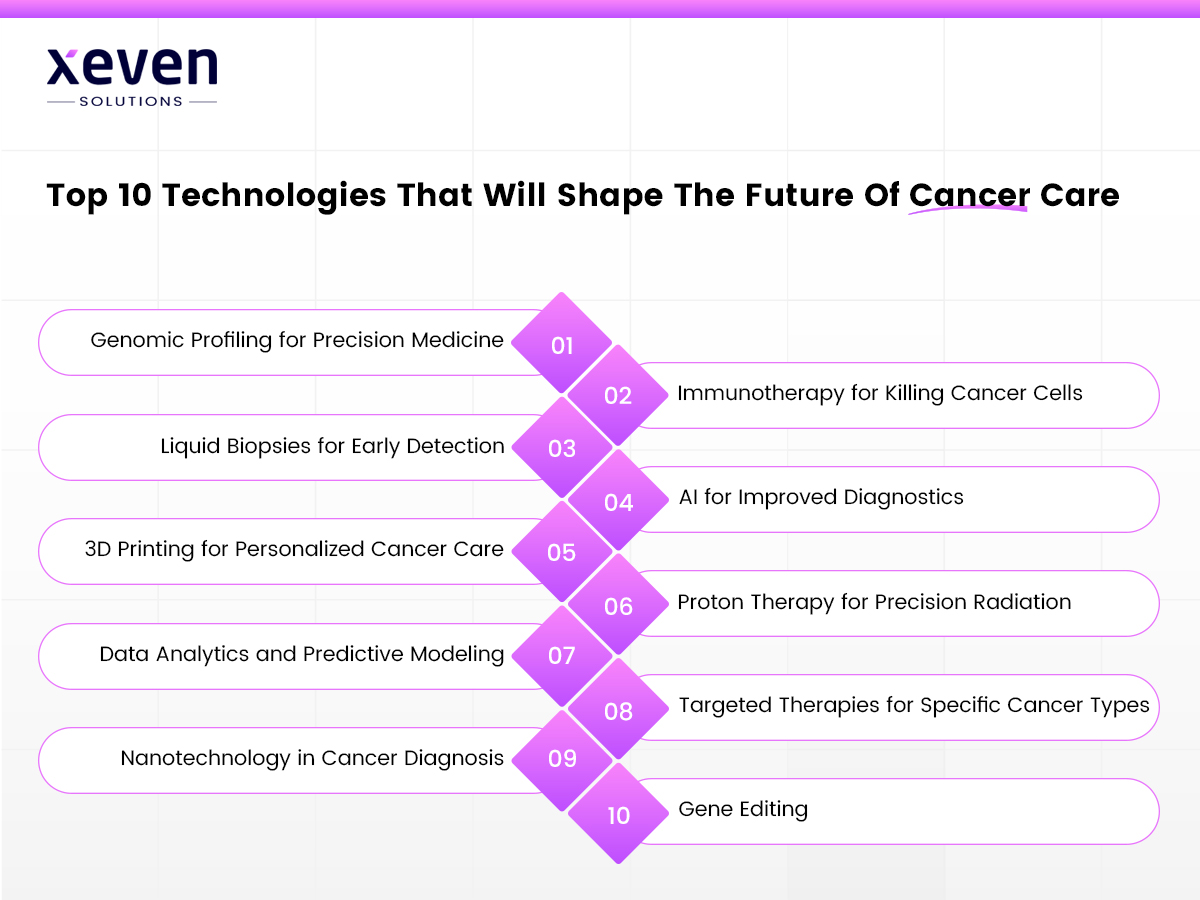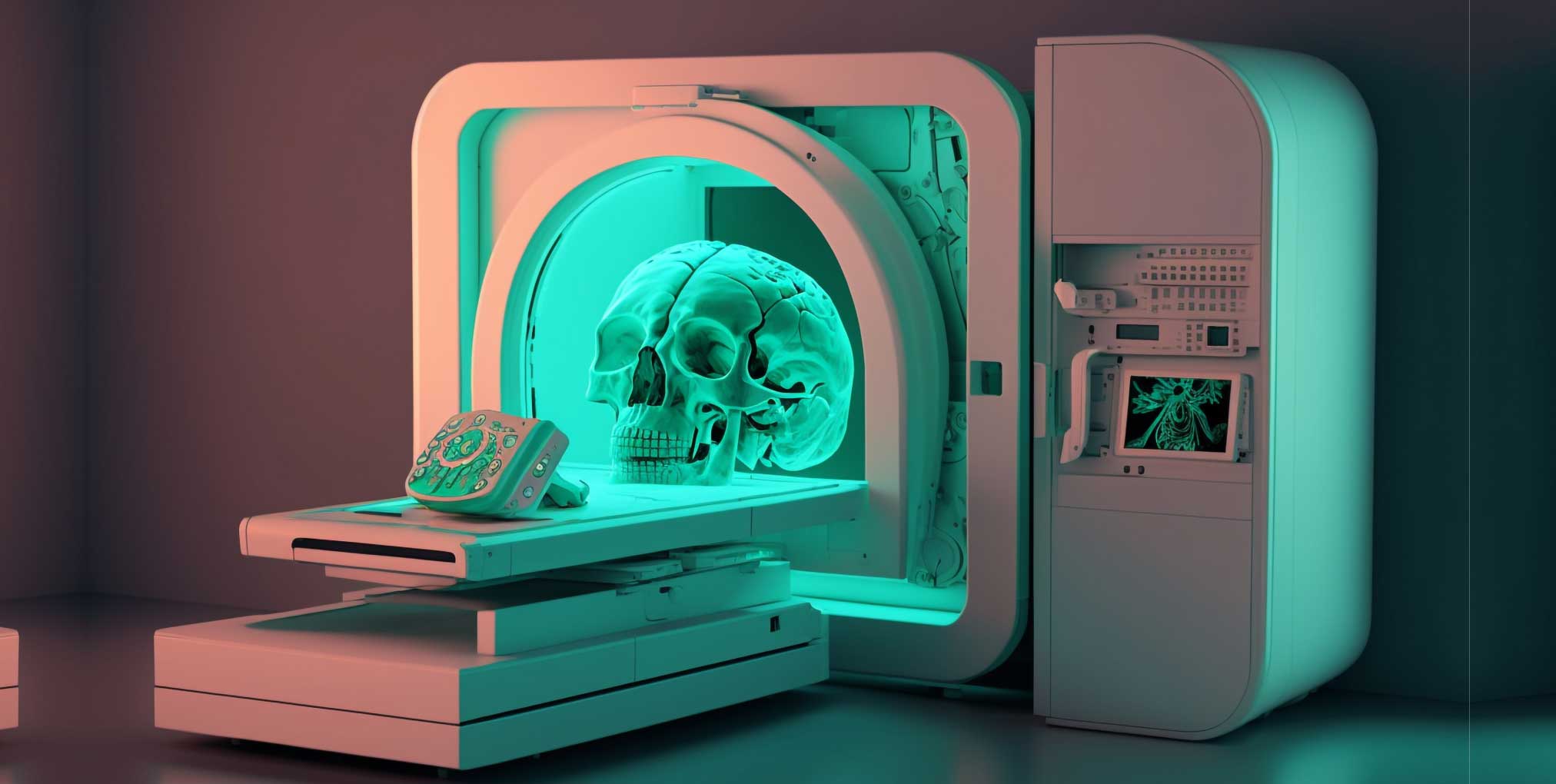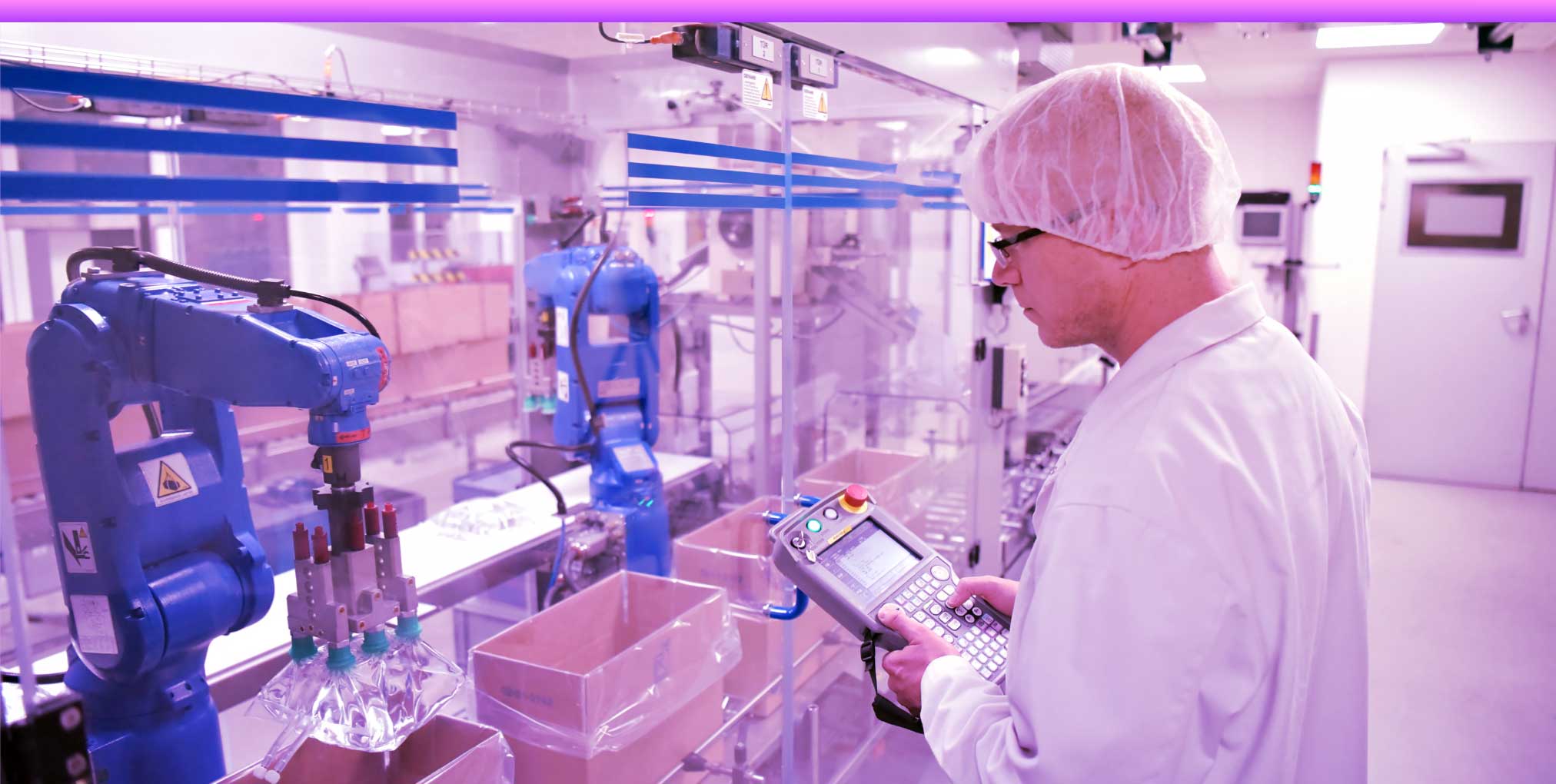

April 19, 2024
The Top 10 Technologies That Will Shape The Future Of Cancer Care
Cancer care has seen remarkable advancements over the years, with technology leading the charge in innovative diagnosis and treatment strategies. The future of cancer treatment is on the verge of transformation, promising a personalized, more effective approach to fighting this complex disease.
As we study cancer technology advancements, we witness a profound potential n in the landscape of cancer care. From early detection to personalized therapies, innovative technologies enhance our understanding of cancer and change how doctors diagnose, treat, and manage this formidable disease.
From groundbreaking advancements in genomics to the integration of artificial intelligence in diagnostics, the future of cancer care is set to be a story of hope, progress, and an improved quality of life for patients worldwide.
Top 10 Technologies That Will Shape The Future Of Cancer Care

1. Genomic Profiling for Precision Medicine
Genomic profiling, or the study of a person’s genetic makeup, revolutionizes cancer treatment. Rather than a one-size-fits-all approach, precision medicine customizes therapies to individual patients, making them more effective and reducing side effects.
Doctors can identify genetic mutations driving the cancer through these cancer technologies, potentially leading to more successful treatments. As genomic profiling becomes more affordable and accessible, it is set to transform the future of cancer care.
2. Immunotherapy for Killing Cancer Cells
Immunotherapy has emerged as one of the powerful cancer technology advancements, leveraging the body’s immune system to fight off the disease. This innovative treatment involves activating or enhancing the body’s immune response to attack cancer cells. With ongoing research and technological advancements, immunotherapy is expected to play a significant role in cancer care in the future.
Breakthroughs in this field, such as immune checkpoint inhibitors and CAR-T cell therapy, have transformed the treatment of various cancers, including melanoma, lung cancer, and leukemia. Ongoing research aims to expand the applicability of immunotherapy to more cancer types and enhance its efficacy.
3. Liquid Biopsies for Early Detection
Traditional biopsies involve invasive procedures and can only provide information about a specific area of the tumor. However, liquid biopsies offer a non-invasive alternative that can detect tiny traces of tumor DNA circulating in the blood. This technology allows for earlier cancer detection and treatment response monitoring, potentially leading to better patient outcomes.
These blood tests detect circulating tumor cells, cell-free DNA, and other biomarkers shed by tumors into the bloodstream. Liquid biopsies enable real-time cancer dynamics monitoring, facilitating timely treatment plan adjustments.
4. Nanotechnology in Cancer Diagnosis and Treatment
Next in cancer technology advancements is Nanotechnology. It involves particles on the nanometer scale and has a significant application in cancer diagnosis and treatment. For diagnostics, nanoparticles can carry specific agents that bind to cancer cells, highlighting them for easier detection. In treatment, these tiny particles can deliver drugs directly to cancers while minimizing damage to healthy cells.
5. Artificial Intelligence for Improved Diagnostics
Medical Advantages of AI are evident in various healthcare domains. Artificial intelligence helps in cancer diagnosis by analyzing large amounts of medical data, such as images from scans or test results, much faster and more accurately than humans can. It can spot patterns and abnormalities that might indicate the presence of cancer cells, even in the early stages when they might be difficult for a human to detect.
Additionally, AI can assist in treatment planning by providing insights into the best therapies based on the specific characteristics of the cancer and the patient’s factors. AI can help monitor how well the treatment works by analyzing ongoing data, allowing doctors to make adjustments to ensure the most effective treatment outcomes.
6. Proton Therapy for Precision Radiation
Proton therapy is a form of radiation treatment that uses protons to precisely target tumors, reducing the risk of damage to surrounding tissues and organs. This technology is especially beneficial in treating pediatric cancers and tumors of the brain, spine, and other critical areas. With ongoing advancements in cancer technologies, proton therapy is set to play a significant role in the future of cancer treatment.
7. 3D Printing for Personalized Cancer Care

3D printing technology enables the fabrication of patient-specific models, implants, and prosthetics for cancer treatment. Surgeons use these models to plan intricate procedures, simulate surgical scenarios, and optimize treatment strategies. Additionally, 3D-printed implants offer customized solutions for reconstructive surgery following tumor resection, enhancing functional and aesthetic outcomes for patients.
8. Targeted Therapies for Specific Cancer Types
Targeted therapies are designed to attack specific molecules involved in cancer growth and progression, making them more effective than traditional chemotherapy. With advancements in genomic profiling and a deeper understanding of cancer biology, the development of targeted therapies for various cancer types is set to increase in the future.
These therapies target cancer cells only by looking at a person’s genes and proteins. These precise drugs can help prevent, find, and treat cancer suitable for patients. The newer versions of these targeted medicines have become more prevalent in the last few years. They will become even more common soon because the technology will become cheaper and more available so that more people can afford them.
9. Gene Editing
Advancements in gene editing techniques, such as CRISPR-Cas9, can potentially modify cancer cells to inhibit tumor growth or enhance sensitivity to existing therapies. Gene editing is one of the cancer technologies that also enables the development of genetically engineered immune cells with enhanced anti-cancer activity, paving the way for novel immunotherapeutic approaches.
10. Data Analytics and Predictive Modeling
Data analytics and predictive modeling involve using advanced computer programs to study vast amounts of medical information. These programs can analyze data from patients’ medical records, such as their test results and genetic information, to find patterns and trends that might not be obvious to humans.
For example, based on past cases, they can predict how well a certain treatment might work for a particular type of cancer. This helps doctors make better decisions about the best treatment options for their patients. By using these computer programs, called machine learning algorithms, healthcare providers can rely on solid data to improve patient outcomes and make the delivery of cancer care more efficient.
Conclusion
The future of cancer treatment is bright, with cancer technology advancements offering new paths to early detection, personalized treatment, and improved patient outcomes. While no one breakthrough will eliminate cancer, the integration of these and other emerging technologies is bringing us closer to a future where cancer is no longer a terminal diagnosis but a manageable chronic condition.
Artificial intelligence deserves a special mention in the role of future cancer care. From improving medical imaging interpretation to early diagnosis, AI is rapidly improving processes and creating new possibilities. With AI development services and the increasing availability of powerful computing, research, and applications in cancer care, we are expected to leap forward with greater precision and speed.








